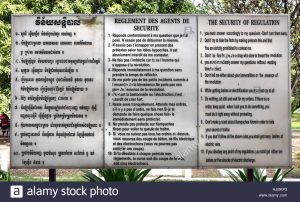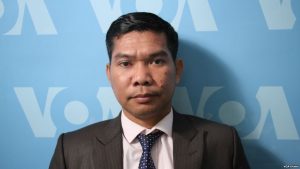
Some critical political philosophy that you should know


Home | ពត៌មាននិងកម្មវិធីផ្សេងៗ | សេចក្តីថ្លែងការណ៏របស់លោកឯកអគុ្គរដ្ឋទូត William A. Heidt ជាមួយអ្នកសារព័ត៌មាន
Op-Ed: US Embassy in Phnom Penh

នៅថ្ងៃទី២ កញ្ញា ខ្ញុំបានចាកចេញទៅសហរដ្ឋអាមេរិក ដោយមិនបានគ្រោងទុក ដោយសារហេតុផល ផ្ទាល់ខ្លួន។ ៤០ នាទីបន្ទាប់ពីខ្ញុំបានចាកចេញទៅ រដ្ឋាភិបាលបានចាប់ខ្លួនលោក កឹម សុខា ជាមេដឹកនាំបក្ស ប្រឆាំង ដោយចោទថាក្បត់ជាតិ ទាក់ទងនឹងមតិដែលលោកទំនងជាបាននិយាយកាលពី ៤ ឆ្នាំមុន។
និយាយដោយត្រង់ទៅ ខ្ញុំគ្មានការភ្ញាក់ផ្អើលទាំងស្រុងនោះទេ នៅពេលខ្ញុំទទួលដំណឹងអកុសលនេះ។ តែខ្ញុំមានការភ្ញាក់ផ្អើលចំពោះការចោទប្រកាន់ទៅលើសហរដ្ឋអាមេរិក ទាក់ទងនឹងការចាប់ខ្លួនលោក កឹម សុខា ដែលគ្មានភស្តុតាងច្បាស់លាស់ ឬគួរអោយទុកចិត្តបានបន្តិចណាសោះ។
វាគឺជាការចោទប្រកាន់មិនធម្មតា។ ការងារការទូត ជាធម្មតា ត្រូវបានធ្វើដោយប្រើភាសាដែលមានការ ប្រយ័ត្ន និងប្រកបដោយការគោរព គឺប្រភេទនៃភាសាដែលខ្ញុំនឹងប្រើនៅថ្ងៃនេះ។ សារដែលពិបាកត្រូវបាន បញ្ជូនជាលក្ខណៈឯកជនសិន។ ប្រទេសជាមិត្តនឹងគ្នាតែងតែរកមើលវិធីបំបាត់ការខ្វែងគំនិតគ្នា។
តែនៅក្នុងឆ្នាំកន្លងទៅនេះ ជាច្រើនដងហើយដែលសហរដ្ឋអាមេរិកបានរងការចោទប្រកាន់គ្មាន មូលដ្ឋាន មិនត្រឹមត្រូវ និងខុសដោយចេតនា។
វាធ្វើអោយខ្ញុំមានអារម្មណ៍ឈឺចាប់ណាស់។ ខ្ញុំគិតថាលោកអ្នកដឹងហើយថា ខ្ញុំមានការទាក់ទងពិសេស ជាមួយប្រទេសកម្ពុជា ហើយខ្ញុំបានមកដល់ប្រទេសកម្ពុជាកាលពី ២ ឆ្នាំមុន ដោយបានទទួលការណែនាំអោយខិតខំលើកកំពស់ទំនាក់ទំនងរបស់យើង។ ជាការពិត ខ្ញុំនិងបុគ្គលិករបស់ខ្ញុំតែងតែគោរពដល់គ្រប់គ្នា ចេញសេចក្តីថ្លែងការជាសាធារណៈក្នុងចំនួនតិចបំផុត ហើយត្រឹមត្រូវ ហើយរកមើលវិធីធ្វើសហប្រតិបត្តិការ និងលុបបំបាត់ការខ្វែងគំនិតគ្នារវាងប្រជាជនដ៏អស្ចារ្យរបស់យើងទាំងពីរ។
ខ្ញុំបានអញ្ជើញអ្នកសារព័ត៌មានមកថ្ងៃនេះ ដើម្បីធ្វើការពន្យល់លើបីចំណុច។ ចំណុចទីមួយគឺងាយទេ ពោលគឺថា រាល់ការចោទប្រកាន់ដែលលោកអ្នកបានលឺ នៅក្នុងពេលប៉ុន្មានសប្តាហ៍ថ្មីៗនេះស្តីពីសហរដ្ឋ អាមេរិក គឺសុទ្ធតែខុសទាំងអស់ ។ អត្ថបទនៅក្នុងសារព័ត៌មានថ្មីៗនេះ ស្តីពីការចាប់ខ្លួនលោក កឹម សុខា ត្រូវ បានគេសរសេរខុសទាំងស្រុងនិងដោយចេតនា ក្នុងការហៅអ្វីដែលសហរដ្ឋអាមេរិកកំពុងធ្វើនៅកម្ពុជា។ វាពិតជាការបង្វែរការយកចិត្តទុកដាក់ចេញពីបញ្ហាពិតប្រាកដមែន (Red herrings)។
ឥឡូវ ខ្ញុំសូមជំរាបលោកអ្នកនូវអ្វីដែលយើងបាននិងកំពុងធ្វើ។ ខ្ញុំមិនអាននូវបញ្ជីសកម្មភាពទាំងអស់ នោះទេ តែការពិតគឺថា កម្មវិធីរបស់យើងមានការស៊ីចង្វាក់គ្នាគួរអោយកត់សំគាល់តាំងពីស្ថានទូតរបស់យើង បានបើកឡើងវិញ នៅឆ្នាំ ១៩៩៤។
ប្រវត្តិសាស្រ្តបានដើរតួនាទីមួយចំណែកនៅក្នុងការចោទប្រកាន់ជាច្រើនក្នុងចំណោមការចោទថ្មីៗ ទាំងនេះ ហើយយើងសូមទទួលស្គាល់កេរ្តិ៍ដំណែលរបស់យើងនៅក្នុងសង្គ្រាមវៀតណាម។ តែយើងមានការ ប្តេជ្ញាចិត្ត នៅក្នុងការដោះស្រាយបញ្ហានៃកេរ្តិ៍ដំណែលនេះ។ តើលោកអ្នកដឹងទេថាយើងបានផ្តល់ប្រាក់ចំនួន ជាង ១៦០ លានដុល្លា សំរាប់ការងារលុបបំបាត់យុទ្ធភណ្ឌមិនទាន់ផ្ទុះ? ពាក់កណ្តាលនៃប្រាក់នេះត្រូវបាន ប្រើសំរាប់លុប បំបាត់យុទ្ធភណ្ឌដែលទំលាក់ដោយយន្តហោះអាមេរិក នៅភាគខាងកើតនៃប្រទេសកម្ពុជា។ តែប្រាក់ចំនួន ពាក់កណ្តាលទៀតត្រូវបានប្រើសំរាប់ដោះមីនរបស់ចិន សូវៀត និងវៀតណាមនៅភាគខាងលិច ប្រទេស នៅតាមចំការមីនដែលមានគ្រោះថ្នាក់ ១០ ដងលើសគ្រាប់ ដែលទំលាក់ ដោយអាមេរិក។
ក្នុងពេល ២ សប្តាហ៍ខាងមុខនេះ យើងនឹងរៀបរាប់រឿងពិតស្តីពីសកម្មភាពរបស់យើង ហើយពន្យល់ ថាហេតុអ្វីក៏វាល្អសំរាប់ប្រទេសយើងទាំងពីរ។ សូមតាមដានទំព័រហ្វេសបុករបស់យើង និងសូមជួយផ្តល់មតិ។
ចំណុចទី ២ របស់ខ្ញុំក៏មានលក្ខណៈសាមញ្ញដូចគ្នានេះដែរ។ ច្រើនដូចការនិយាយស្តីពីប្រទេសអាមេរិកនៅពេលនេះដែរ គឺថាព្រឹត្តិការណ៍នៅក្នុងខែកន្លងទៅនេះមិនប៉ះពាល់ទៅលើសហរដ្ឋអាមេរិកទេ តែវាប៉ះពាល់ ទៅលើប្រទេសកម្ពុជាទៅវិញទេ។ មួយជំហានម្តងៗ ព្រឹត្តិការណ៍ទាំងនេះកំពុងតែធ្វើអោយប្រទេសកម្ពុជា ឯក កោពីសហគមន៍អន្តរជាតិ ក្នុងពេលដែលកម្ពុជាត្រូវការជំនួយគាំទ្រអន្តរជាតិ ដើម្បីលើកកំពស់សេដ្ឋកិច្ចរបស់ ខ្លួនអោយឡើងមួយកំរិតទៀត ហើយប្រកួតប្រជែងជាមួយប្រទេសជិតខាងនៅក្នុងសមាគមអាស៊ាន។
សំដីប្រឆាំងអាមេរិកបានធ្វើឲ្យជនជាតិអាមេរិក និងអ្នកទេសចរណ៍លោកខាងលិចជាច្រើន មាន អារម្មណ៍លែងកក់ក្តៅជាងមុន ពេលធ្វើដំណើរមកកម្ពុជានាពេលបច្ចុប្បន្ន។ ឆ្នាំនេះអ្នកទេសចរទាំងនោះ អាចទៅចាយលុយ នៅហាឡុងបេយ៍ ឬនៅភូកេតជាជាងនៅអង្គរវត្ត។
នាពេលបច្ចុប្បន្ន ក្រុមហ៊ុនអាមេរិក និងលោកខាងលិចក៏មានអារម្មណ៍លែងកក់ក្តៅជាងមុនផងដែរ ហើយក្រុមហ៊ុនកាន់តែតិចថែមទៀតនឹងមកវិនិយោគនៅកម្ពុជា។ លោកអ្នកប្រហែលជាបានឃើញសេចក្តីថ្លែងរបស់ក្រុមប្រឹក្សាធុរកិច្ច អាមេរិក អាស៊ានទាក់ទងនឹងរឿងនេះហើយ។
អ្នកធ្វើការបរិច្ចាកមនុស្សធម៌អាមេរិក ដែលជាក្រុមធំជាងគេ និងមានទ្រព្យច្រើនជាងគេនៅក្នុង ពិភពលោក ក៏លែងមានអារម្មណ៍គិតថា ខ្លួនគេត្រូវបានទទួលស្វាគមន៍ដែរ។ខ្ញុំប៉ាន់ប្រមាណថាអង្គការ សប្បុរសធម៌អាមេរិកបានសាងសង់សាលាជាង ១.០០០ នៅកម្ពុជា។ វាជាចំនួនដ៏ច្រើនមែនទេ? ខ្ញុំបាន ឮពីអង្គការសប្បុរសធម៌ធំៗខ្លះថាការធ្វើប្រតិបត្តិការនៅកម្ពុជាកាន់តែប្រឈមនឹងហានិភ័យខ្លាំង ហើយ ពួកគាត់កំពុងតែពិចារណាប្តូរការងារល្អៗរបស់គាត់ទៅឥណ្ឌូនេស៊ី បង់ក្លាដេស ឬវៀតណាមវិញ។
ប៉ុន្តែផលប៉ះពាក់ធ្ងន់ធ្ងរបំផុតធ្លាក់មកលើកិត្តិយសរបស់កម្ពុជាក្នុងនាមជាប្រទេសប្រជាធិបតេយ្យក្មេងខ្ចី។ កាលពីបីខែកន្លងទៅ កម្ពុជាបានរៀបចំការបោះឆ្នោតដែលមានភាពសេរី និងយុត្តិធម៌បំផុតរបស់ខ្លួន តាំងតែ ពីឆ្នាំ១៩៩៣មក។ ជាភាពត្រឹមត្រូវ ប្រជាជនកម្ពុជាមានមោទនភាពចំពោះរឿងនេះ ហើយជាភាពត្រឹមត្រូវ ដែលសហរដ្ឋអាមេរិកបានអបអរសាទររដ្ឋាភិបាល និងប្រជាជនកម្ពុជាចំពោះរឿងនេះ។
បីខែបានកន្លងផុតយ៉ាងឆាប់រហ័សមកដល់ពេលនេះ។ ជាការពិត ប្រសិនបើការបោះឆ្នោតជាតិកម្ពុជា ប្រព្រឹត្តទៅនៅថ្ងៃនេះ គ្មានអ្នកសង្កេតការណ៍អន្តរជាតិគួរឲ្យជឿជាក់ណាមួយចាត់ទុកថាការបោះឆ្នោតនេះ មានភាពសេរី និងយុត្តិធម៌ ឆ្លុះបញ្ចាំងអំពីឆន្ទៈរបស់ប្រជាជនកម្ពុជាឡើយ។
ខ្ញុំសង្ឃឹមថា គ្រប់គ្នានឹងគិតអំពីចំនុចនេះដោយប្រុងប្រយ័ត្ន។ ប្រទេសប្រជាធិបតេយ្យមានលក្ខណៈពិសេស។ ក្នុងប្រទេសប្រជាធិបតេយ្យ ប្រជាជនធម្មតាមានតួនាទីពិតប្រាកដនៅក្នុងប្រទេសរបស់គាត់ ហើយ ទំនាក់ទំនងរបស់រដ្ឋាភិបាល និងប្រជាជនមានភាពរឹតតែស៊ីជម្រៅ។ ប្រទេសដទៃមើលមកអ្នកក្នុងន័យផ្សេង ផងដែរដូចជាមានការគោរពនិងយល់កាន់តែច្រើន។ វាជាអ្វីដែលសមនឹងតម្លៃនៃការតស៊ូ។
ហើយចំនុចចុងក្រោយរបស់ខ្ញុំគឺ៖ ទោះបីជាមានព្រឹត្តិការណ៍ទាំងអស់កើតឡើងកាលពីខែមុនក្តីខ្ញុំគិត ថា នៅតែមានពេលដើម្បីសង្រ្គោះការបោះឆ្នោតឆ្នាំ២០១៨របស់កម្ពុជាបាន បន្តការអភិវឌ្ឍប្រជាធិបតេយ្យ របស់កម្ពុជា និងស្តារទំនាក់ទំនងទ្វេភាគីរបស់យើង។ ប៉ុន្តែវាទាមទារឲ្យមានសកម្មភាពម៉ឺងម៉ាត់ជាបន្ទាន់។
យើងសូមចូលរួមជាមួយសហភាពអឺរ៉ុប ក្នុងការទាមទារឲ្យដោះលែងលោក កឹម សុខា ជាបន្ទាន់។ ដំណើរការធម្មតារបស់ទីផ្សារសារព័ត៌មានកម្ពុជាក៏គួរទទួលបានការស្តារឡើងវិញផងដែរ។ ការដាក់ សម្ពាធលើសង្គមស៊ីវិលគួរត្រូវបានបញ្ឈប់។ ហើយប្រហែលជាសំខាន់ជាងនេះទៅទៀតនោះ រដ្ឋាភិបាល, បក្ស ប្រឆាំង, និងសង្គមស៊ីវិលគួរតែចាប់ផ្តើមកិច្ចសន្ទនា អំពីអនាគតប្រជាធិបតេយ្យរបស់កម្ពុជា ក្នុងបរិយាកាស បើកចំហរ គោរព និងគ្មានសម្ពាធ។
ខ្ញុំសូមបញ្ចប់ដោយការកត់សំគាល់ផ្ទាល់ខ្លួនថា ចាប់តាំងពីយើងមកដល់ប្រទេសកម្ពុជាកាលពី២ឆ្នាំមុនភរិយាខ្ញុំ កូនប្រុសខ្ញុំ និងរូបខ្ញុំផ្ទាល់មានកិត្តិយសដែលទទួលបានការស្វាគមន៍យ៉ាងកក់ក្តៅពីប្រជាជនកម្ពុជា រៀងរាល់ថ្ងៃជាពិសេសកាលពីខែមុន។ ហើយខ្ញុំក៏មានមោទនភាពចំពោះការខិតខំ និងការប្តេជ្ញាចិត្តរបស់ បុគ្គលិកអាមេរិកនិងខ្មែររបស់ស្ថានទូត ព្រមទាំងសហគមន៍អាមេរិកជាទូទៅផងដែរ។
ជាការពិត អាមេរិកមិនមែនជាប្រទេសស្មុគ្រស្មាញពិបាកធ្វើការជាមួយនោះទេ។ សូមធ្វើមកលើយើង ដោយយុត្តិធម៌ និយាយជាមួយយើងដោយស្មោះត្រង់ ធ្វើសហប្រតិបត្តិការជាមួយគ្នាតាមដែលអាចធ្វើបាន ប្រើប្រាស់អំណាចទីផ្សាររបស់យើងដើម្បីជាប្រយោជន៍របស់អ្នក ស្វាគមន៍កម្មវិធីជំនួយ និងក្រុមហ៊ុនរបស់យើង។
ក្តីសង្ឃឹមរបស់ខ្ញុំគឺថា រដ្ឋាភិបាលកម្ពុជានឹងបង្ហាញដល់យើងនូវសុឆន្ទៈដែលយើងបានបង្ហាញដល់គេ ដើម្បីបន្តឡើងវិញនូវភាពជាដៃគូដ៏ពិសេស និងខ្លាំងក្លាដែលយើងមានរហូតមកដល់កាលពីមួយឆ្នាំមុននេះ។
សូមអរគុណច្រើន!
KONGKEA CHHOEUN – 01 SEP, 2017
Op-Ed: New Mandala
 It might be easy to forget given the events of recent weeks, but Cambodian democracy had until a few years ago been making progress. Many key indicators of democratic quality had continued their improvement since the 1998 national elections, which followed the near collapse of the system in the aftermath of the July 1997 internal fighting between armed forces loyal to Prime Minister Hun Sen and Prince Norodom Rannariddh.
It might be easy to forget given the events of recent weeks, but Cambodian democracy had until a few years ago been making progress. Many key indicators of democratic quality had continued their improvement since the 1998 national elections, which followed the near collapse of the system in the aftermath of the July 1997 internal fighting between armed forces loyal to Prime Minister Hun Sen and Prince Norodom Rannariddh.
Competition among political parties increased, thanks to the unification of the opposition parties in 2012 ahead of the 2013 national election. The economy has grown extraordinarily well over the past decades, averaging 7% per year since 1993 and helping poverty to fall more than one percentage point per year on average since 2003. Inequality has also declined. Vertical political accountability has been strengthened markedly, thanks to the decentralisation and de-concentration reform program the government has implemented over the past two decades. Cambodians are increasingly able to hold local leaders to account for their actions through local democratic processes.
The 2013 polls were a turning point. The ruling CPP (Cambodian People’s Party) lost the popular vote for the first time since 1998. (It did not win the popular vote during the UNTAC period.) The CPP saw its popular vote plummet by more than 20 percentage points in that election. To its credit, the CPP-led government subsequently implemented various reforms aimed at winning the hearts and the minds of Cambodian voters, including public servants. The CPP has permitted moderate reforms, particularly in the ministries of Education, Youth and Sports, Commerce, Environment, Economy and Finance, and Foreign Affairs and International Cooperation. The National Electoral Committee has also been restructured and made somewhat more independent. The government has increased public servants’ official pay dramatically since 2013. In August 2017, Hun Sen also promised a slew of new benefits for garment workers, including a big increase in their monthly minimum wage—from US$153 to at least $168, plus pensions.
But with the carrots have come sticks.
Indicators of horizontal accountability have either stalled or are in decline. Local and international NGOs and media had been able to operate with comparatively little constraint and control from the state before the pre-2013 national election period. Since then, the government has made disturbing moves that wipe out progress made in terms of political openness prior to 2013. Among a range of actions is the passage of legislation governing NGOs. Despite a boycott by the opposition, the parliament passed a Law on Associations and Non-Governmental Organisations (LANGO), which requires the nearly 5,000 domestic and international NGOs that work in the country to register with the government and report their activities and finances or risk fines, criminal prosecution, and being shut down.
Last month, the government used this law to order the National Democratic Institute (NDI) to shut down its operations and repatriate its foreign staff within one week, prompting the US embassy in Phnom Penh to question the Cambodian government’s commitment to democracy. The government accused the NDI of illegally operating in the country. (The embassy claimed that the NDI has worked to promote democracy in Cambodia since the early 1990s.)
The Cambodian government has also targeted foreign and foreign-linked media. In August this year, the government accused The Cambodia Daily of failing to pay more than US$6 million in taxes, giving the paper one month to resolve the issue or risk being shut down. The Daily is an American-owned outlet credited for its reports critical of the government. In addition, the government instructed more than a dozen radio stations across the country to cease operations, accusing them of failing to report how much and to whom they sell their airtime. Some of these radio stations were reportedly selling their airtime to Radio Free Asia (RFA) and the Voice of America (VOA). The Cambodia Daily, RFA, and VOA are critical of the Cambodian government and are thus seen as promoting the interests of the opposition parties.
The question is: why is this happening now?
Two major factors, one internal and one external, may explain the government’s recent measures against international NGOs and media. Internally, these measures were escalated as a result of the June 2017 local government elections, the result of which represented a big boost for the opposition CNRP (Cambodian National Rescue Party) and a serious blow to the CPP. After the June 2017 local government elections, the CPP still controlled the majority of local governments—1,156 or 70% of communes. Nevertheless, the CNRP took over almost all of the rest. The opposition party’s share of local governments has increased about 12 fold in comparison with the last local elections, held in 2012.
Op-Ed: Committee for Election Rights of Overseas Cambodians (The CEROC)
បទសម្ភាសន៍ VOA៖ សកម្មជនសិទ្ធិបោះឆ្នោតខ្មែរនៅបរទេសខកចិត្តនឹងប្រកាសក្រសួងមហាផ្ទៃ
 គណៈកម្មាធិការដើម្បីសិទ្ធិបោះឆ្នោតរបស់ពលរដ្ឋខ្មែរនៅក្រៅប្រទេសស្នើសុំឱ្យគណៈកម្មាធិការជាតិរៀបចំការបោះឆ្នោតធ្វើឱ្យនិរាករណ៍ប្រកាសរបស់ក្រសួងមហាផ្ទៃ ដែលបន្ថែមនីតិវិធីក្នុងការចុះឈ្មោះអ្នកបោះឆ្នោតថ្មី។ អង្គការនេះចាត់ទុកថាប្រកាសរបស់ក្រសួងដែលតម្រូវឱ្យពលរដ្ឋស្នាក់នៅកន្លែងណាមួយរយៈពេល៣០ថ្ងៃមុននឹងអាចចុះឈ្មោះបាន នឹងមានផលប៉ះពាល់ដល់ពលករចំណាកស្រុក និងពលរដ្ឋខ្មែររស់នៅក្រៅប្រទេសដែលចង់ទៅចូលរួមបោះឆ្នោតក្នុងពេលខាងមុខ។ សូមលោកអ្នកនាងស្តាប់បទសម្ភាសន៍រវាងលោក ម៉ែន គឹមសេង នៃវីអូអេ ជាមួយនឹងលោក សេង សុភ័ណ ប្រធានគណៈកម្មាធិការនេះដូចតទៅ៕
គណៈកម្មាធិការដើម្បីសិទ្ធិបោះឆ្នោតរបស់ពលរដ្ឋខ្មែរនៅក្រៅប្រទេសស្នើសុំឱ្យគណៈកម្មាធិការជាតិរៀបចំការបោះឆ្នោតធ្វើឱ្យនិរាករណ៍ប្រកាសរបស់ក្រសួងមហាផ្ទៃ ដែលបន្ថែមនីតិវិធីក្នុងការចុះឈ្មោះអ្នកបោះឆ្នោតថ្មី។ អង្គការនេះចាត់ទុកថាប្រកាសរបស់ក្រសួងដែលតម្រូវឱ្យពលរដ្ឋស្នាក់នៅកន្លែងណាមួយរយៈពេល៣០ថ្ងៃមុននឹងអាចចុះឈ្មោះបាន នឹងមានផលប៉ះពាល់ដល់ពលករចំណាកស្រុក និងពលរដ្ឋខ្មែររស់នៅក្រៅប្រទេសដែលចង់ទៅចូលរួមបោះឆ្នោតក្នុងពេលខាងមុខ។ សូមលោកអ្នកនាងស្តាប់បទសម្ភាសន៍រវាងលោក ម៉ែន គឹមសេង នៃវីអូអេ ជាមួយនឹងលោក សេង សុភ័ណ ប្រធានគណៈកម្មាធិការនេះដូចតទៅ៕
១. តេីដឺស៊ីរ៉ក់ជាអ្វី?
ដឺសេរ៉ក់ជាពាក្យកាត់ភាសាអង់គ្លេសដែលមានន័យថា គណកម្មាធិការដេីម្បីសិទ្ធិបោះឆ្នោតរបស់ពលរដ្ឋខ្មែរនៅក្រៅប្រទេស ជាអង្គការក្រៅរដ្ឋាភិបាល មិនស្វែងរកកម្រៃ មានទីស្នាក់ការធំនៅប្រទេសកាណាដា។
The CEROC is an abbreviation of “Committee for Election Right of Overseas Cambodians”, is a non-governmental organization (NGO), non-profit orientation, and main office is based at Canada.
២. តេីដឺស៊ីរ៉ក់មានគំរោងដេីម្បីសំរេចយុទ្ធនាការរបស់ខ្លួនយ៉ាងណា?
តាមរយះការចូលរួមពីប្រជាពលរដ្ឋកម្ពុជានិងមិត្តអ្នកស្រឡាញ់លទ្ធិប្រជាធិបតេយ្យទាំងអស់ យេីងកំពុងតំរង់ទិសដេីម្បីសម្រេចគោលដៅរួមតែមួយគឺសិទ្ធិមូលដ្ឋានរបស់ប្រជាពលរដ្ឋខ្មែរ ដែលកំពុងរស់នៅឯនាយសមុទ្របានចូលរួមបោះឆ្នោតនូវរាល់ការបោះឆ្នោតជាតិរបស់កម្ពុជា ដែលសិទ្វិនេះត្រូវបានធានាដោយរដ្ឋធម្មនុញ្ញកម្ពុជានិងសេចក្តីថ្លែងការណ៍ជាសាកលស្តីពីសិទ្ធិមនុស្សរបស់អង្គការសហប្រជាជាតិ។ យុទ្ធនាការចំបងរបស់យេីងគឺការផ្្តល់ចំណេះដឹងដល់ប្រជាពលរដ្ឋខ្មែរ ការស្នើរអោយរដ្ឋសភាធ្វើវិសោធនកម្មច្បាប់រដ្ឋធម្មនុញ្ញដោយនិយាយអោយច្បាស់ថាប្រជាពលរដ្ឋខ្មែរនៅក្រៅប្រទេសអាចមានសិទ្ធិបោះឆ្នោតបាន និងបោះពុម្ពផ្សាយនានាទាក់ទងនឹងសិទ្ធិបោះឆ្នោតរបស់ប្រជាពលរដ្ឋខ្មែរនៅក្រៅប្រទេស។
